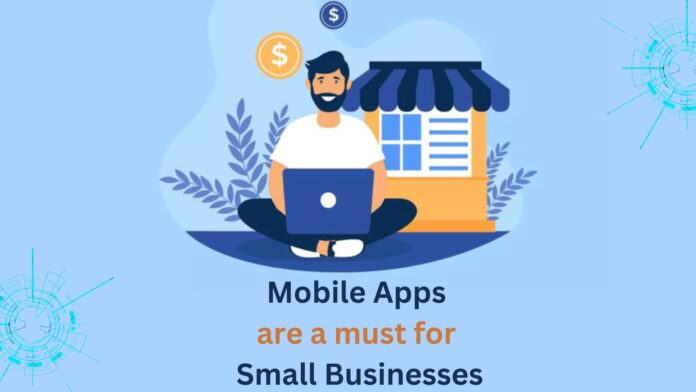Introduction:
In today’s digital age, the smartphone has become an extension of our lives, a constant companion that opens a world of possibilities at our fingertips. With billions of mobile devices in the hands of consumers worldwide, it’s no surprise that mobile apps have surged in popularity. They offer convenience, accessibility, and an unparalleled opportunity for businesses to connect with their audience.
Consider this: The number of mobile app downloads worldwide is predicted to increase from 247 billion in 2020 to 299 billion in 2023, based on a 7% annual growth trend. This is a considerable increase compared to the 218 billion downloads reported in 2021. These statistics illustrate mobile apps’ undeniable influence in shaping how we interact with businesses and access services. But the pivotal question remains: Is owning a mobile app a good investment for small businesses?
In this blog post, we delve deep into the realm of mobile apps for small businesses. We’ll explore their myriad benefits, dissect the factors to consider, and provide insights into whether a mobile app is a strategic move for your small business. Let’s embark on this journey to discover whether owning a mobile app is the right path for your small business.
Benefits of Having a Mobile App:
A mobile app for your small business can offer many benefits that can significantly impact your success. Here are some key advantages:
- Increased Visibility and Accessibility: A mobile app is like having a digital storefront that never closes. Customers are constantly reminded of your presence with the app residing on their smartphones. This visibility goes beyond the physical limitations, reaching a global audience 24/7. Additionally, apps can utilize features like geolocation to provide tailored offers and promotions when users are near your business location, increasing foot traffic.
- Enhanced Customer Engagement: Mobile apps are a direct line of communication between your business and its customers. You can instantly reach out to users with updates, promotions, and personalized content with one push notification. This real-time interaction fosters a sense of connection and engagement, keeping your brand top-of-mind. Moreover, in-app messaging and feedback forms enable customers to quickly reach your business, promoting an open and responsive dialogue.
- Brand Loyalty and Customer Retention: Mobile apps cultivate brand loyalty by offering a more personalized and convenient experience. Users who download your app have already shown a commitment to your brand. You can strengthen this connection by providing them with exclusive discounts, loyalty programs, or content. Moreover, the ease of use and the ability to tailor the app to individual preferences make customers more likely to return, boosting customer retention rates.
- Improved Marketing and Sales: Mobile apps provide a powerful platform for marketing and sales efforts. They enable you to collect valuable user data, such as browsing and purchase history, allowing for highly targeted marketing campaigns. You can use this data to send personalized product recommendations or offers, increasing the chances of conversion. Furthermore, in-app purchases and mobile payment options streamline the buying process, making it more convenient for customers to complete transactions, ultimately boosting sales and revenue.
How will understanding Target Audience and Market Research help in App development?
Understanding your target audience is paramount to embarking on the journey of owning a mobile app for your small business. Your app’s success hinges on its ability to cater to their needs and preferences. Here’s why:
- Your mobile app should be a solution to a problem or a source of value for your audience. To achieve this, you need a deep understanding of your customers, what they want, and how they use mobile apps. Are they primarily iOS or Android users? What are their preferences when it comes to app features and design? Knowing your audience’s mobile app usage habits can guide you in creating an app that resonates with them.
- Before you invest in app development, conducting thorough market research is a smart move. It helps you determine whether your target audience would benefit from a mobile app. Study your competitors and their mobile app offerings, assessing what works and what doesn’t. Market research can reveal whether there is a demand for your app and how it might fit into your customers’ daily lives.
Understanding Costs and Budget Considerations for App Development:
While the potential benefits of a mobile app are compelling, it’s essential to be aware of the costs involved and explore budget-friendly development options:
- Initial and Ongoing Costs: Developing and maintaining a mobile app involves various expenses. Initial costs include design, development, and possibly marketing. Ongoing costs encompass app updates, server hosting, and customer support. Understanding these costs upfront allows you to budget effectively and avoid financial surprises.
- Cost-Effective App Development: Small businesses often operate with limited budgets. To make app ownership more feasible, consider cost-effective development options. App builders and low-code platforms offer affordable solutions, allowing you to create a basic app with minimal coding knowledge. Alternatively, dedicated software development team from an outsourcing firms can be a wise investment, as it ensures a high-quality app without needing an in-house team.
Why do competitors analyze before developing an app?
For small businesses considering the development of a mobile app, a comprehensive competitive analysis is a vital step. Here’s why:
- Analyzing Competitors for App Viability: Research and understand what your competitors do in the mobile app space. Are they already offering an app to their customers? If so, how are users responding to it? Investigate their app’s features, design, and functionality. This will provide insights into whether having a mobile app can be a competitive advantage in your industry.
- Evaluating the App Landscape: Assess whether there are unmet needs or opportunities in your market that your app could address. Identify areas where competitors may fall short and where your business could excel. A well-executed app can set you apart and give you a significant edge, but only if it meets or exceeds customer expectations.
User Experience matters the most:
Creating an exceptional user experience is fundamental for the success of your mobile app:
- Users should be able to navigate and use the app without confusion. An attractive and user-friendly interface engages users and reflects positively on your brand.
- Prioritize a responsive layout, intuitive navigation, and consistent branding. Ensure your app is optimized for different screen sizes and provides users with a seamless and enjoyable experience.
- Consider how each feature benefits your customers and your business. Features that enhance the user experience, solve problems, or simplify processes will be particularly valuable.
- Features should align with your business’s overall goals and, equally importantly, address your target audience’s specific needs and pain points. Avoid feature bloat; focus on what truly matters to your customers to keep the app efficient and user-centric.
Once the app is built, how will you market it?
Once your mobile app is developed, the next crucial step is to promote it to reach a wider audience effectively:
- Leverage your existing customer base to kick-start promotion. Encourage loyal customers to download the app by offering exclusive incentives.
- Utilize social media platforms to create awareness. Share engaging content, sneak peeks, and tutorials to pique interest and encourage downloads.
- Partner alongside bloggers or influencers who are popular with your target market. Their recommendation can greatly increase the visibility of your app.
- Invest in paid advertising, such as installing app ads on platforms like Facebook and Google Ads.
- Implement a referral program where existing users are rewarded for referring new users to your app.
Some real-life examples with eye-catching numbers:
- Airbnb’s mobile app led to a 25% increase in user engagement, showcasing the power of a well-designed app.
- Starbucks’ app combines loyalty rewards and mobile ordering, leading to over 23 million active users and accounting for a significant percentage of their sales.
Conclusion:
In conclusion, developing a mobile app for your small business should be based on a thorough understanding of your target audience, a well-designed user experience, and a clear focus on functionality that aligns with your business goals and customer needs.
Recommendations:
- Prioritize understanding your audience and competition to determine if a mobile app is the right choice.
- Invest in user-friendly design and follow mobile app design principles.
- Carefully choose app features that cater to customer needs and support your business objectives.
- Promote your app effectively using various strategies, including ASO and marketing campaigns.
- Consider alternatives like responsive websites or PWAs and weigh the pros and cons.
- Use real-life case studies to draw inspiration from successful mobile app implementations.
The decision to invest in a mobile app should align with your small business’s unique circumstances and goals. By following these guidelines and considering your specific needs, you can make an informed choice that ultimately benefits your business and customers.
Author Bio
Vikas Agarwal is the Founder of GrowExx, a Digital Product Development Company specializing in Product Engineering, Data Engineering, Business Intelligence, Web and Mobile Applications. His expertise lies in Technology Innovation, Product Management, Building & nurturing strong and self-managed high-performing Agile teams.















